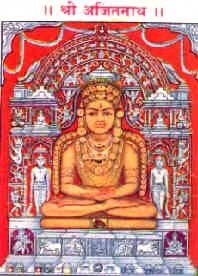Jain Tirthankar
 |
Ajitnath Swami
|
Name |
Ajitnath Swami |
|
Symbol |
Elephant |
|
Father |
Jeetshatru Raja |
|
Mother |
Vijaya Devi |
|
Family Name |
Ikshvaku |
|
Source of Descent |
Vijay |
|
Date of Descent |
Vaishakh Shukla Paksh-13 |
|
Place of Birth |
Vinita |
|
Date of Birth |
Magh Shukla Paksh-8 |
|
Place of Enlightenment |
Ayodhya |
|
Date of Diksha |
Magh Krishna Paksh-9 |
|
Date of Enlightenment |
Paush Krishna Paksh-11 |
|
Place of Nirvana |
Sammetshikhar |
|
Date of Nirvana |
Chaitra Shukla Paksh-5 |
|
Period of Practices |
12 Years |
|
Age |
72 Lac Purva |
|
Chief Disciple |
Simhasen |
|
Number of Disciples |
95 |
|
Number of Ascetics |
1 Lac |
|
Head of Female Ascetics |
Phalgu |
|
Number of Female Ascetics |
3.3 Lac |
|
Male Laity |
2.98 Lac |
|
Female Laity |
5.45 Lac |
|
Body Colour |
Golden |
|
God of Organisation |
Mahayaksha |
|
Goddess of Organisation |
Ajitbala |
The soul that became Bhagavan Ajitnath, in its earlier incarnation, was the great king Vimalvahan of Susima city in Mahavideh area. He led a pious life in spite of the available princely grandeur. At an appropriate time, he became an ascetic under Arindam Suri. Meditating about the omniscient and liberated souls and indulging in harsh penance, he purified his soul to a level where he could earn the Tirthankar-nam-and-gotra-karma. Completing his age, he reincarnated as a god in the Viaya-anuttar-dimension.
After completing his age in the dimension of gods, he descended into the womb of queen Vijaya Devi, wife of king Jitshaturu of Vinita town. Queen vijaya Devi saw the same fourteen dreams. This was a queer coincidence. When the augers were consulted they informed that Vijaya Devi will give birth to a Tirthankar and Vaijayanti to a Chakravarti (monarch of six continents).
During the period of the queen’s pregnancy, the influence of king Jitshatru enhanced to an extant that even the enemy kingdoms sought and negotiated friendly treaties with him. it became a common practice to say, "King Jitshatru is invincible (Ajit)."
The queen gave birth to a son on the eighth day of the bright half of the month of Magh. Inspired by the popular lore, the king named the new born as the Ajit. The same night vaijayanti also gave birth to a son who was named Sagar. Then both the princes came of age they were married. Time passed with the fusion of happiness.
When king Jitshatru became old and wanted to devote the last part his life to spiritual pursuit, he called his younger brother and asked him to take over the throne. Sumitra had no desire for the kingdom, he too wanted to become an ascetic. Both the princes were called and offered the kingdom. Ajit Kumar was a naturally detached person since childhood, and so he too declined. At last prince Sagar ascended the throne.
Ajit Kumar became an ascetic in his youth and went into remote and dense forests for his meditation and penance. His personality and the intensity of his lofty practices cast a pacifying influence all around. Natural enemies in the animal kingdom, like lion and cow, wolf and deer, snake and mongoose used to come and sit around him peacefully.
After a twelve year period of deep meditation and other spiritual practices attained omniscience on the eleventh day of the bright half of the month of Paush. The gods created the divine pavilion and Bhagawan Ajitnath gave his eloquent and magnetic discourses. Thousands of people accepted the path of renunciation.
King Sagar, during this period, conquered the six continents and became Chakravarti. King Meghvahan and Vidyadhar Bhim, the ruler of the island of Rakshasas (demons), were the illustrious contemporaries of Emperor Sagar. Once they went to a discourse of Bhagavan Ajitnath. There, Vidyadhar Bhim was drawn towards spiritual life. He became so detached that he gave his kingdom including the famous cities of Lanka and Patal Lanka to king Meghvahan. He also gave all his knowledge and miraculous powers to Meghvahan. Besides this he gave a divine necklace of nine large and shining beads. Meghvahan was the first king of the Rakshas clan in which the famous king Ravana was born.
Death of Sagar’s Sixty Thousand Sons : Emperor Sagar had thousands of queens and sixty thousand sons. Eldest among them was Janhu Kumar. Once all the princes went for an outing. When they arrived at the base of Astapad hills, they dug up large ditches and canals. In their youthful abandon they flooded these canals with the water of river Ganges. This flash flood inundated the houses and villages of the lower gods known as Nag Kumars. The king of these gods, Jwalanprbh came and tried to stop them in vain. The unruly princes were intoxicated with the regal power. At last Jwalanprabh lost his temper and turned all the sixty thousand princes to ashes.
This sudden death of all his sons was a traumatic experience for Emperor Sagar. He handed over the empire to his eldest grandson, Bhagirath, and took Diksha from Bhagavan Ajitnath.
When his last moments were approaching, Bhagavan Ajitnath went Sammetshikhar. With one thousand other ascetics, he commenced his final meditation. He attained Nirvana on the fifth day of the bright half of the month of Chaitra.
-----------------------------------------------------
Mail to : Ahimsa Foundation
www.jainsamaj.org
R2912